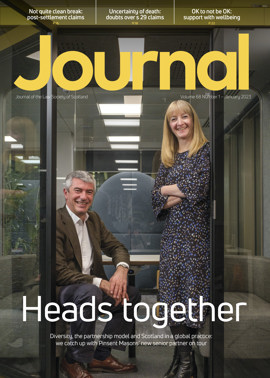Viewpoints: January 2023
Denning defended
In his “Criminal Court” column at Journal, December 2022, 26, your venerable columnist Frank Crowe gratuitously opines that “Lord Denning was of his time and said many things which would not be acceptable nowadays.”
I would be interested to have drawn to my attention any evidence at all that substantiates this judgmental assertion. I may be perceived as being biased as regards this matter, seeing that I had the privilege of meeting socially with the late Lord Denning, and my finding him to be a down-to-earth, unassuming, and gracious gentleman, but amongst his more than 2,000 published judgments, and very many published writings, I find precious few things, let alone “many things”, said therein that some may think to be unacceptable nowadays.
Furthermore, I am of opinion that, in the case of a judge, his being “of his time” is both praiseworthy and indeed a sine qua non for the job. Lord Denning should perhaps be best remembered for his being receptive to what was best in the jurisprudence of the European Union, long before our accession thereto. For my part, Lord Denning was the greatest UK civil judge of the 20th century.
George Lawrence Allen, Edinburgh
Elephant in the room
Among the initial responses to the Government’s announcement of its plans for the future regulation of the Scottish legal profession (see article in this issue) was a series of posts over the Christmas period by Brian Inkster, founder of Inksters Solicitors, on his blog page “The Time Blawg”. We draw readers’ attention for their interest, in addition to the regular Blog of the Month post.
A supporter of the Roberton proposal for a single independent regulator, Inkster considers that the Government’s response has “No real rebuttal around the point that good regulation should be independent of those it regulates, which seems to be the elephant in the room.” He doubts that the proposed first tier regulator with an independent regulatory committee “comes even close” to avoiding “capture”, i.e. the process by which regulation becomes directed away from the public interest and towards the interests of the regulated industry itself.
Inkster’s view is that independence is the trend in regulation generally, as well as being the position for legal services in England & Wales since 2007. That jurisdiction still has a very complex regulatory structure, but he cites the 2020 independent review by Professor Stephen Mayson which calls for a single regulator there also, with certain powers of delegation to other bodies.
The question is raised among the comments posted in response whether this would create too large a machinery. The comments, and the further posts in the series, are also worth a look by those with an interest in the debate. – Editor
Regulars
Perspectives
Features
Briefings
- Civil court: Costs – the tail that wags the dog
- Licensing: Keeping alcohol out of sight
- Planning: A framework for sustainability?
- Insolvency: When is a creditor not a creditor?
- Tax: A new, improved autumn statement?
- Immigration: First stop Rwanda?
- Scottish Solicitors' Discipline Tribunal: January 2023
- Civil court: Expenses – barred by delay?
- Property: Transparency, human rights and the registers






